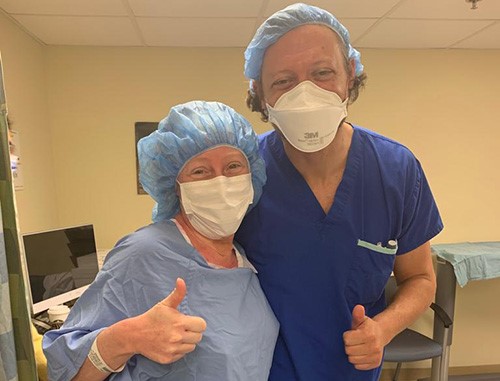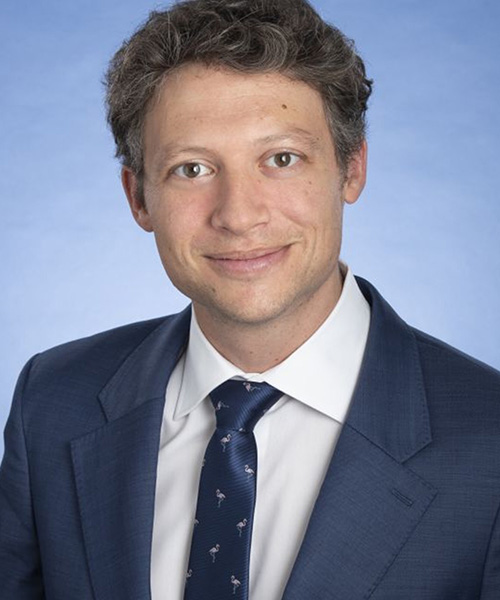
For patients with thyroid tumours, surgery can be intimidating, invasive and, in some cases, even life-altering.
An innovative procedure called radiofrequency ablation (RFA) could offer patients a less invasive option that doesn't require surgery and reduces the potential for undesirable side effects.
This procedure was performed for the first time in Canada by Dr. Jesse Pasternak, a surgeon at the Endocrine Clinic at Princess Margaret Cancer Centre and UHN's Sprott Department of Surgery.
RFA is commonly used for chronic lower back pain, neck and arthritic joints, and its use on thyroids is currently approved to remove large or cancerous thyroid nodules. Dr. Pasternak is conducting a clinical trial to support the use of this procedure on small, suspicious nodules.
"The goal of this research is to get this treatment approved to provide the least invasive options to the most patients," he says.
The procedure will also help reduce the surgical backlog.
"As we transition patients from a surgical waitlist to an hour-long procedure with no in-hospital recovery time, those surgical spots can be filled with patients with other, more concerning types of cancer who can now get treatment," says Dr. Pasternak.
Thyroid nodules are very common, occurring in more than 50 per cent of people during their lifetime. A thyroid nodule is a solid or fluid-filled lump that forms within the thyroid. While many do not cause symptoms, they can grow large enough to cause pain, difficulty swallowing, cosmetic concerns and even lead to thyroid cancer.
Patients are often left with the choice of dealing with these symptoms until they become a larger issue, or undergoing invasive neck surgery.
A thyroidectomy, the surgery that often removes nodules, can lead to a number of undesirable side effects, such as loss of thyroid function and cosmetic concerns for patients with post-thyroidectomy scarring. Dr. Pasternak has been exploring minimally invasive removal options for decades and is motivated by a desire to offer patients options and allow his patients more flexibility in their treatment.
"For patients who are not candidates for or don't want surgery, radiofrequency ablation is a potential solution to directly target the nodule with no negative effects to the thyroid," he says.
The RFA procedure preserves thyroid function and leaves the patient without a scar.

Dr. Jesse Pasternak is a surgeon at the Endocrine Clinic at Princess Margaret Cancer Centre and UHN's Sprott Department of Surgery. (Photo: UHN)
A first-in-Canada milestone
The first RFA procedure for a thyroid nodule in Canada was completed April 20 of this year. Deborah Guitmann Mutchnik was 52 when a thyroid nodule she had been monitoring for seven years started to become worrisome. When she found out she was eligible for this study, she jumped at the opportunity.
"I was calling them every two weeks, trying to schedule an appointment," she says. "I don't like surgery, so this was a perfect alternative."
In a thyroid radiofrequency ablation procedure, an ultrasound is used to guide a small needle directly into the thyroid nodule. The tip of the needle is heated with radiofrequency energy which destroys the nodule and kick-starts a shrinking process.
RFA is intended to reduce the size of a nodule to a point where symptoms no longer affect the patients' day-to-day life.
Deborah's study treatment has shown a reduction in the size of her thyroid nodule in follow-up appointments, paving the way for more procedures to be completed in the following weeks.
The recovery time was so minimal for Deborah that she actually did it in the middle of her vacation.
"I flew from Florida to get the procedure done, and the next day, I flew back," she says. "Dr. Pasternak made sure I was very comfortable every step of the way."
The study is seeking to find whether the RFA procedure can entirely eliminate smaller nodules. It also would allow patients to have suspicious nodules treated before they have the chance to grow into something more dangerous.
"I am very proud to have been a part of this study that has the potential to provide solutions to others in need," Deborah says.
Dr. Pasternak and his team hope their pioneering research will allow this procedure to become widespread in Canada to provide more options to patients everywhere.
This story first appeared on UHN News